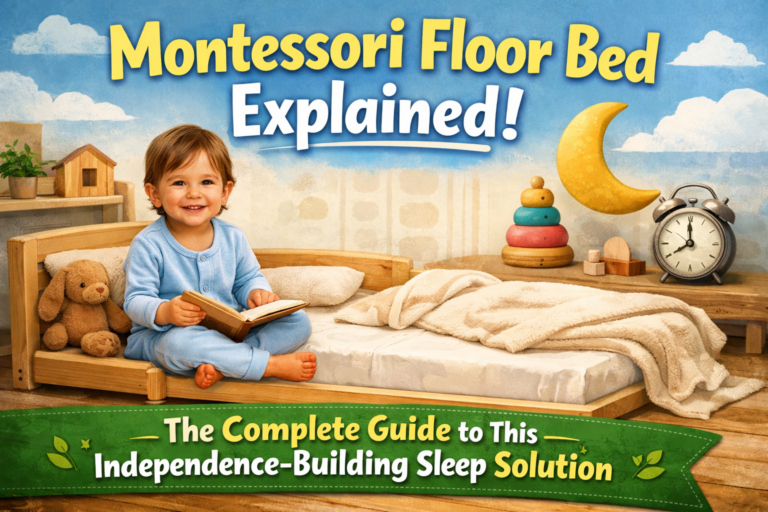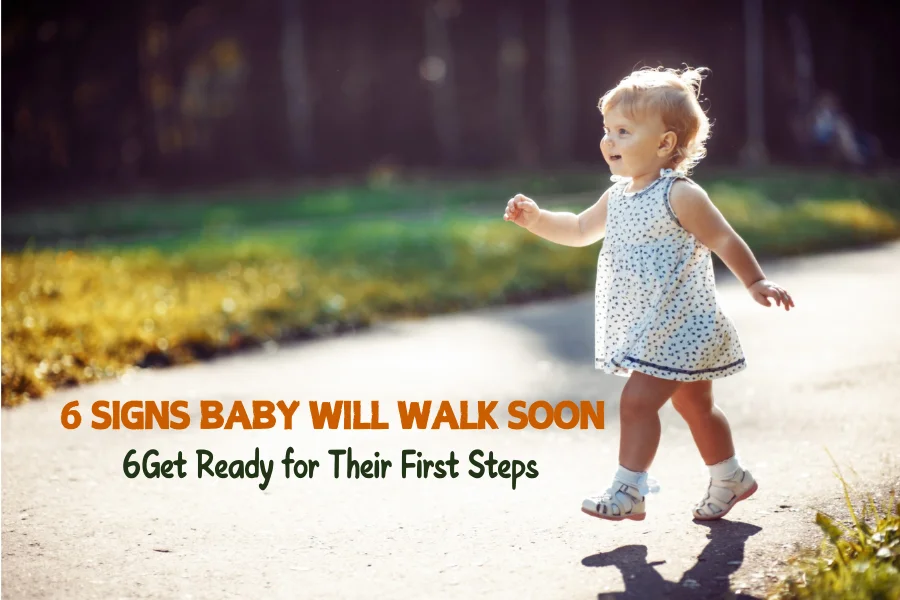
The progression of your baby from crawling and taking the first steps is a huge event in every parent’s journey. It’s such a big and exciting moment full of anticipation and happiness. However, before those first steps do take place, there are several key signs to show your little one is almost ready to take on walking.
Pulling up to stand, and then cruising around the furniture, your baby gives you lots of hints that he or she will be walking soon. So let’s discover the 6 major signs baby will walk soon. Therefore, you can get ready to expect the first steps of your darling baby.
When Can A Baby Begin Walking?
Babies generally begin to walk anytime between the ages of 9 to 18 months. Every infant progresses at a different rate. Some will take an early lead and begin to walk right on schedule at 9 months, while others take their sweet time, starting to walk at 18 months.
Thus, it is normal when your kid still hasn’t walked when they are at 15 months. Personality and how much time they invest in practice can make a big difference. Some babies are wary and take their time, while others are daring and raring to go! Provided your baby is progressing with their mobility, there’s no need to worry.
6 Clear Signs Baby Will Walk Soon
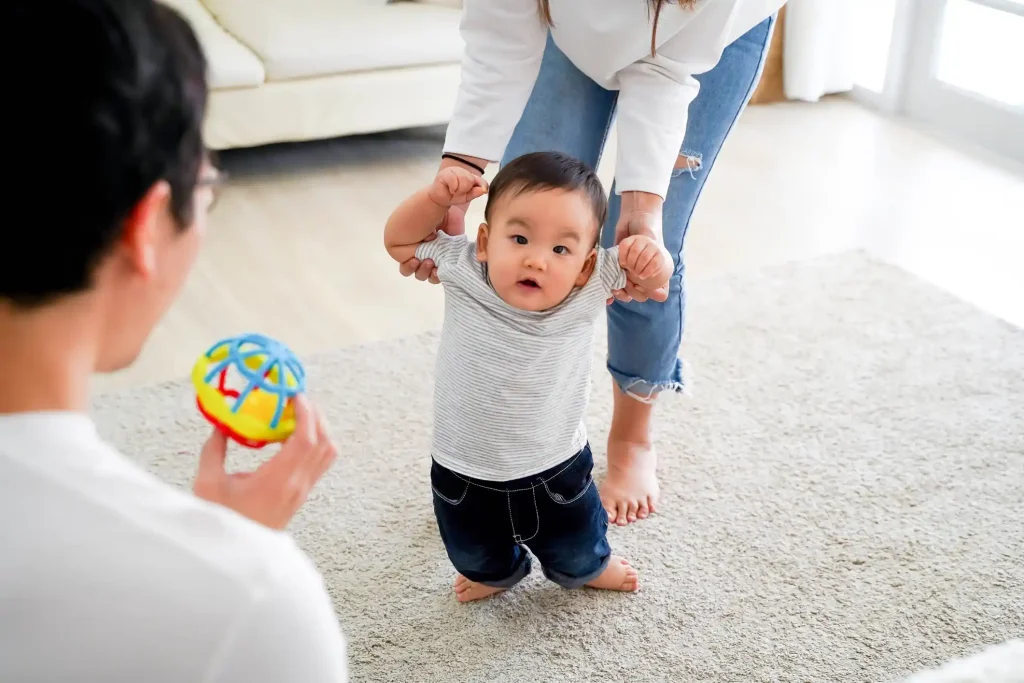
Your baby’s journey to walking can be quite fascinating to watch! While every baby develops at a different rate, there are clear-cut signs that show your little one is getting ready to take their first steps. Here are 6 important signs baby will walk soon. Look out for those hints so that you can support and encourage your baby to walk better.
Pull Up To Stand
One of the earliest indications that your baby will be ready to walk is if they start pulling themselves up into a standing position. Whether onto furniture or into your leg, this effort shows they are building the muscles and balance necessary to stand and eventually walk.
You need to know that a baby can’t learn to walk if it can’t stand. It’s a natural process and a clean hint you should notice. Your baby will try to grab the sides of a chair (or any other furniture) to get up. It may take up to 3 months for a newborn to learn to walk independently.
Try To Stand Without Support
You may observe that your infant tries to take off furniture and stands freely. Even if they are only able to stay up for a couple of seconds, this is a big achievement toward being able to walk independently! These sudden snatches of standing are an indication that they are building confidence and balance.
Mona Amin, a BabyBjörn pediatric ambassador & pediatrician in Florida said:
“Walking requires the motor skill pattern, balance, and confidence on their own two feet”
The baby will stand, fall, and then get up again. This practice will help them walk. Babies will gradually stand more stable and longer with time until they are confident enough to take a step.
Cruise Around In The Room
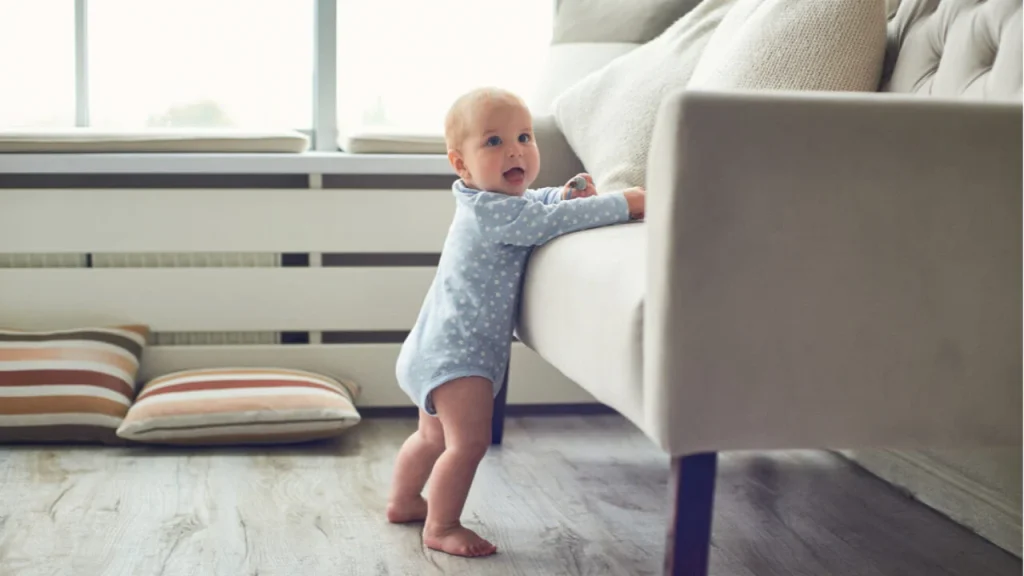
When your baby can stand holding onto furniture, they may begin “cruising”. They will try to move from one point to another by using furniture or some other support for balance. In this phase, the coordination needed for walking is developed as they get used to shifting their weight from one foot to the other.
At this stage, childproofing is very crucial. Make sure to prepare a safe path and steady objects for the baby to hold and move forward. Plants, light chairs, or anything that is not attached safely to the ground of the wall should be moved. They can fall over and cause injury to the baby.
Walk With Help
Babies like a little support from mom and dad to learn how to walk. If your baby reaches out for your hands and delights in walking with your support, they’re strengthening their legs and learning the motions they will soon need to take independent steps. You can let your baby use push toys to encourage them to walk more.
Cry & Alter Sleep Patterns
Sometimes the approach of a new developmental milestone, such as walking, can disrupt a baby’s sleep. Your baby may wake more frequently or sleep more, it differs from one to one. They seem fussier than usual and this may be related to mental and physical advances occurring in preparation for taking that first step.
Become A Little Explorer
You may notice that your baby is getting even more curious and wants to explore his surroundings. Increased mobility and curiosity are signs that your baby will be walking any day now. They may start to climb over furniture, jump from the couch, or wander around much more than usual!
These signs point to your baby reaching the threshold of a major step in the baby milestone chart. Be prepared for those adorable first steps!
Tips To Encourage Your Baby To Walk
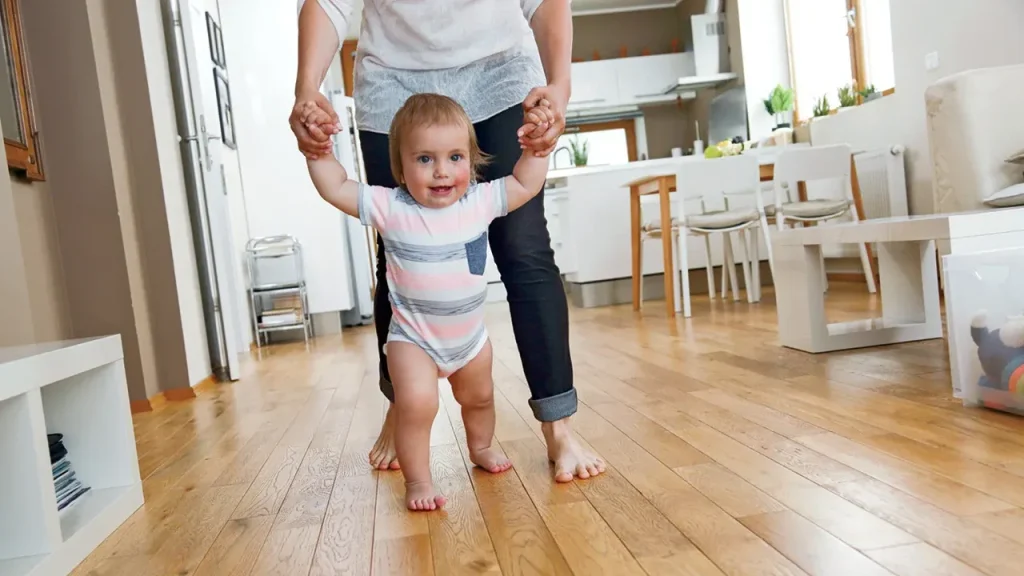
It’s such an exciting time for both you and your baby when it’s time to take those first steps. Of course, every baby learns to walk in their own sweet time, but there are some ways you can encourage them along the way. Here are some tips that will help your baby gain the confidence and strength they need to start walking:
Encourage Cruising
Let your baby practice “cruising” by making sturdy furniture available for them to hold onto and make their way. You can make this space safe by padding corners and removing sharp objects. Cruising helps newborns develop their balance and coordination, 2 essential skills for walking.
Use Push Toys
Stability toys include push toys that provide extra stability as your baby may want to practice walking. These will allow your baby to lean into them and push themselves around the room to help build leg strength and balance. Activity center tables are also a great choice to encourage them to practice standing.
Walk With Your Baby
Holding your baby’s hands while they walk around is great for building their confidence. It gives them the support that they will need, yet it still will allow them to make the movements of walking. Let them take the lead and gradually ease your grip to encourage independence.
Encourage Standing Independently
Place toys or other objects just beyond the baby’s reach to encourage him to stand independently. This simple game motivates them to practice standing on their own, improving their balance and stability.
Cheer Them On
Plenty of encouragement goes a long way! Celebrate the small victories and praise him each time he makes an achievement. Your positive reinforcement will give him all the confidence needed to try and try until he masters walking.
When Should You Be Concerned About A Baby’s Walking?
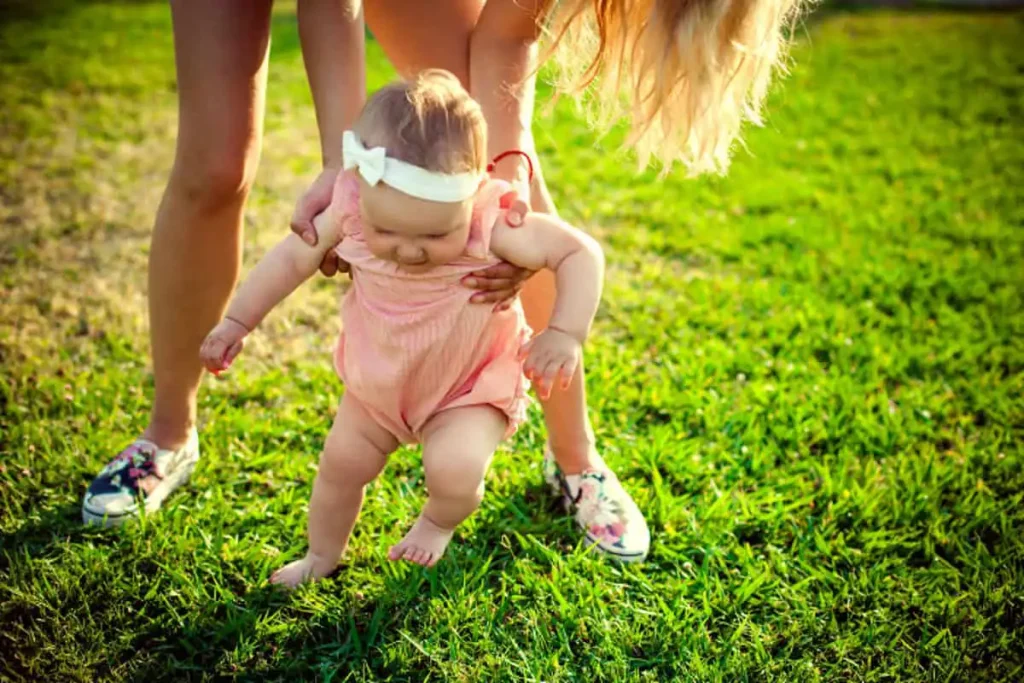
It’s natural for parents to wonder when their baby should start walking, but every baby has a different growth pattern. Most babies begin walking between the ages of 9 and 18 months. Therefore, by the time your child is 18 months old and has not started to walk, you should get in touch with your pediatrician. You should also be concerned if your baby isn’t pulling up to stand, doesn’t try to move around while holding onto furniture, or seems to have trouble supporting their weight on their legs.
Why Does Baby Start Walking Late?
There are a lot of reasons why some babies simply take longer to walk than others. Physical causes, relatively uncommon, include conditions like soft or weak bones (known as rickets) and muscle disorders such as muscular dystrophy and cerebral palsy. However, a late walker is usually a matter of personality. Some babies may be more cautious or laid-back1 and just take a little longer before they are ready to take those first steps.
A Word From Babies Parent
Witnessing your infant take their first steps is an amazing, charming, and unforgettable experience. That is a wonderful, adorable, and unforgettable moment. Those signs baby will walk soon will let you know that they are ready to walk. Every baby hits this milestone at their own pace, so don’t worry if your little one takes a bit longer. With plenty of encouragement, safe spaces to practice, and lots of patience, your baby will be confidently walking before you know it.
Source
- Focus on the Family. (2024, January 25). Child Is Overly Cautious – Focus on the Family. https://www.focusonthefamily.com/family-qa/child-is-overly-cautious/ ↩︎






